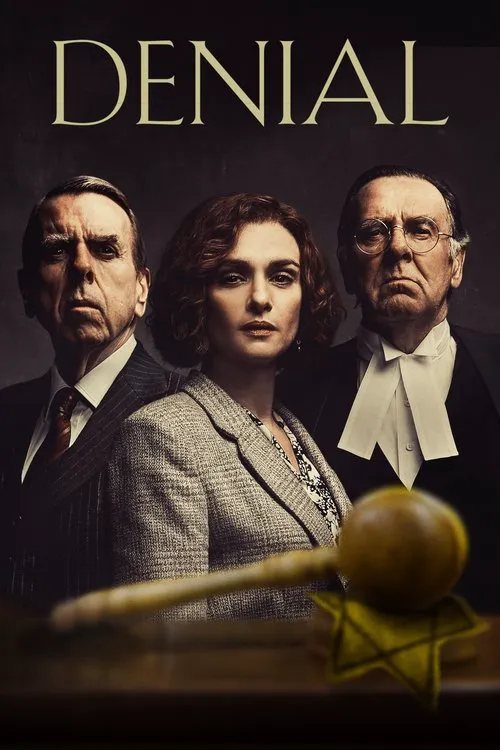Denial

Enredo
In the midst of the ongoing debate surrounding one of the most pivotal events in human history, author and historian Deborah E. Lipstadt found herself entangled in a treacherous web of lies and deceit. As a renowned expert on the Holocaust, Deborah's meticulous research had earned her a reputation as a steadfast advocate for truth and justice. However, her unwavering commitment to exposing the atrocity came at a heavy price when she chose to challenge the very fabric of history itself – by denying its validity. The catalyst for this monumental battle was none other than the infamous Holocaust denier, David Irving. A man who had spent years propagating his distorted vision of the past through his writings, Irving had taken grave offense to Deborah's critique of his work in her book 'Denying the Holocaust: The Growing Assault on Truth and Memory.' His response was swift and merciless, as he decided to file a libel lawsuit against Deborah, accusing her of defaming his character by labeling him an "Holocaust denier." At first glance, the odds seemed insurmountable for Deborah. Irving's lawsuit not only threatened to tarnish her reputation but also raised the specter of financial ruin and personal devastation. Furthermore, the very nature of libel laws favored Irving's cause, as he was merely required to prove that Deborah had made false statements about him, whereas she would have to prove the truth of their validity. Undaunted by the challenge ahead, Deborah embarked on a relentless pursuit of justice. Recognizing the gravity of the situation, she turned to her trusted friend and colleague, lawyer Anthony Julius. Together, they assembled a formidable team of experts, ready to take on the formidable forces that sought to undermine the historical truth of the Holocaust. The trial itself became a battleground, with Irving pulling out all the stops to discredit Deborah and disprove the very existence of the Holocaust. With his trademark arrogance and confidence, Irving proclaimed that Deborah had failed to adequately cite her sources, thus rendering her entire argument baseless. He also repeatedly attempted to deflect any scrutiny of his own credibility, dismissing concerns about his dubious sources and questionable methodology. Despite facing unrelenting pressure, Deborah remained unwavering in her resolve. Backed by an arsenal of historical documents, eyewitness testimony, and academic consensus, she valiantly fought against Irving's relentless assaults on her argument. Through sheer force of will and dedication, Deborah successfully managed to hold her ground against Irving's vitriolic attacks. As the trial raged on, Deborah began to feel the weight of Irving's relentless harassment. From questioning her professional judgment to questioning her personal values, the Holocaust denier repeatedly sought to demonize her, to portray her as an unfeeling, dogmatic scholar hell-bent on stifling historical debate. Meanwhile, Irving himself presented a calculated image of moderation and intellectual integrity, skillfully manipulating public opinion by projecting an aura of reasonableness and objectivity. However, behind the façade of David Irving's intellectual posturing lay a calculating opportunist, using the platform of the libel trial to advance his insidious agenda of discrediting the Holocaust. His real intention was to undermine the legitimacy of historical truth itself, creating room for his warped narrative of history to take hold. In a pivotal moment during the trial, Deborah delivered a heart-wrenching testimony, one that laid bare her personal reasons for dedicating her life to the pursuit of historical truth. By sharing the experiences of Holocaust survivors and their families, Deborah humanized the otherwise abstract concept of history, revealing its visceral, tangible impact on real lives. In doing so, she inadvertently exposed Irving's cynical exploitation of history for his own purposes – not to seek the truth, but to perpetuate a toxic, revisionist myth that threatened to destroy the fragile fabric of human empathy and understanding. The day of reckoning finally arrived, as the jury delivered its verdict in favor of Deborah Lipstadt. By doing so, they implicitly recognized the importance of standing up against the insidious forces of historical revisionism and defending the truth against those who sought to distort it for their own agendas. In a victory that echoed through the annals of history, Deborah emerged triumphant, but at a personal cost that left her shaken. In the aftermath of the trial, she reflected on the lessons she had learned from the ordeal – that the fight for historical truth had been a journey that spanned her entire lifetime, one that she had been driven by a relentless desire to protect the dignity and memory of Holocaust survivors.
Resenhas
Recomendações




